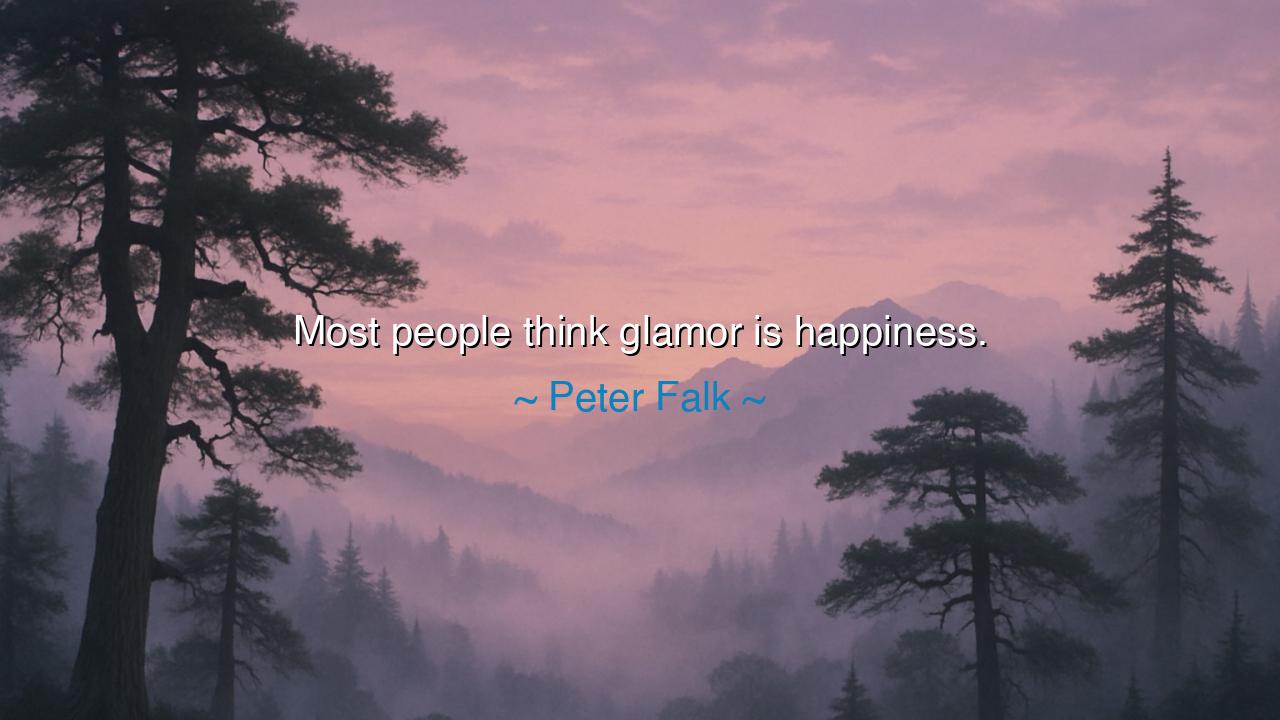
Most people think glamor is happiness.






In the words of Peter Falk, “Most people think glamor is happiness.” These words, though spoken simply, cut deep into the heart of illusion — the false light that blinds the modern soul. Falk, known to the world as the rumpled detective Columbo, understood both the lure and the emptiness of fame. His quote is not a condemnation of beauty or success, but a warning: that glamor, though it glitters, is not the same as joy. It dazzles the eyes but leaves the spirit hungry. True happiness, Falk reminds us, is quiet, enduring, and often unseen — while glamor is the mask the world wears to hide its restlessness.
The origin of this quote lies in Falk’s reflections on Hollywood and his long career within its bright yet deceptive lights. He saw countless actors, creators, and dreamers chasing the shimmer of success, believing that once they reached it, they would finally be fulfilled. Yet Falk himself, despite his fame, lived humbly and often spoke about the simple pleasures that sustained him — painting, family, laughter, the joy of doing honest work. He knew that the glamor of the screen is a mirage: a light that shines brightly, but only from the outside. To the world, fame looks like happiness; to the one who holds it, it often feels like loneliness dressed in gold.
The ancients too warned against this confusion. The Stoic philosopher Epictetus taught that the pursuit of external beauty and admiration distracts the soul from its true work — the cultivation of virtue and peace. To seek joy in appearances, he said, is to build a house upon sand. The wise instead seek what cannot be seen — the harmony of thought, word, and action. In this way, Falk’s reflection belongs not to the vanity of the film industry, but to the timeless wisdom of humanity itself. Glamor fades, but character endures. To confuse one for the other is to mistake a reflection for the sun itself.
Consider the story of Marilyn Monroe, whose image defined glamor for generations. To the world, she was the embodiment of beauty, fame, and charm — a goddess of the silver screen. Yet behind that brightness lived a woman aching for meaning, crushed beneath the weight of the world’s gaze. Her life, so radiant from the outside, was haunted by emptiness within. In her, the illusion of glamor met the tragedy of human longing. She reminds us that the cost of mistaking glamor for happiness can be devastating — for one can possess everything the world desires and still feel utterly unseen.
Peter Falk, in his humble trench coat and unassuming demeanor, stood as the opposite of this illusion. He showed that authenticity has its own quiet power. There was no vanity in his work, no false perfection — only craft, sincerity, and humor. In the world of glittering stars, he was the reminder that humanity itself is more compelling than glamor could ever be. His wisdom is the same as that of the ancient poets, who said that joy comes not from adornment, but from truth; not from being admired, but from being real.
What, then, is the lesson hidden within Falk’s words? It is that we must learn to see beyond appearances — in others, and in ourselves. Do not mistake the shine of success for the warmth of fulfillment. Seek instead the things that do not depend on applause: kindness, friendship, purpose, creation, and peace. These are not glamorous, but they are radiant. When you live truthfully — when your inner life glows with contentment — the world’s lights lose their power to dazzle or deceive.
In practice, this means cultivating simplicity. Step back from the noise of comparison and ask yourself what truly nourishes you. Celebrate quiet victories. Find beauty in imperfection. Choose depth over display, substance over spectacle. Happiness is not found in being admired, but in being whole. To live by this truth is to walk with dignity in a world obsessed with mirrors.
So, remember the wisdom of Peter Falk: glamor is not happiness — it is the illusion of it. Let the world chase its glitter, if it must. You, instead, seek the light that cannot be dimmed — the light that burns quietly within the soul. For in that flame lies the only joy that endures: the peace of knowing who you are, even when no one is watching.






AAdministratorAdministrator
Welcome, honored guests. Please leave a comment, we will respond soon